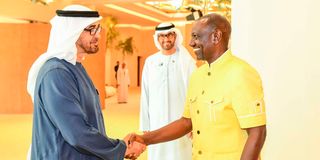
President William Ruto shakes hand with President Sheikh Mohamed bin Zayed Al Nahyan of the United Arab Emirates.
In the aftermath of the collapsed Jomo Kenyatta International Airport Adani takeover deal, many Kenyans breathed a sigh of relief. But new revelations by chief presidential adviser and economist David Ndii have peeled back another layer of the story, confirming that the deal was bankrolled by the United Arab Emirates (UAE).
The UAE is not just a rich “friend” offering slick financing and infrastructure partnerships. It is a major player in Africa’s shadow economy, fuelling wars, backing militias, laundering money and extracting resources with a brutal disregard for human rights or regional stability.
In 2024 alone, the UAE imported over $1.5 billion worth of Sudanese gold. Most of that gold is controlled by the Rapid Support Forces (RSF), a militia accused of war crimes, ethnic cleansing and indiscriminate drone strikes. The RSF uses the gold revenue to buy weapons, many trafficked through regional networks, including Kenya, according to Reuters.
Just this year, RSF leaders met in Nairobi to launch a rival “government” while their forces were butchering civilians back home. Kenya, once a proud neutral actor in regional conflicts, is now a stopover for warlords.
Decade of chaos
This isn’t the UAE’s first rodeo. In Libya, the Gulf state played a central role in funding and arming warlord Khalifa Haftar during the country’s post-Gaddafi civil war. Why? To control access to oil terminals in Benghazi and gold smuggling routes across southern Libya. The result was over a decade of chaos, a fragmented state and over 400,000 displaced people, all while UAE-linked firms quietly extracted resources amid the wreckage.
Under President William Ruto, Emirati capital is pouring in fast, from ports to highways to airport concessions like the Adani deal. It’s dressed up as development. But cheap money is never free; there are always strings.
Had the Adani-JKIA deal gone through, Kenya would have handed strategic infrastructure to a foreign conglomerate with direct links to a government funding genocide in Sudan. JKIA isn’t just any other airport; it’s a node of national security, a logistics hub and a geopolitical choke point. You don’t let strangers hold the keys to your front door.
Diplomatically, Kenya is playing a dangerous game. Sudan has filed a case at the International Court of Justice, accusing the UAE of sponsoring genocide. Ethiopia and other Inter-Governmental Authority on Development members are growing uneasy. If we don’t act quickly, Kenya could lose its regional credibility and find itself isolated—no longer a peace broker, but a war proxy.
The Adani-JKIA deal was just the beginning. The broader concern is Kenya’s drift into a geopolitical axis that sees African states not as partners, but as extraction points for minerals, markets and influence.
Regional instability
By entrenching UAE financial and military interests in our economy and infrastructure, we are exposing ourselves to a foreign policy we do not control, one that may ultimately drag us into proxy wars and regional instability.
To be clear, this is not about rejecting foreign investment. It’s about rejecting exploitation masquerading as partnership. The Adani saga was a warning shot. The next deal may not collapse. And when it goes through, the cost will be borne not by the politicians who signed it, but by the Kenyan people.
Kenya must choose to be independent or to be bought.
The writer is a whistleblower, strategy consultant and a startup mentor. [email protected]







